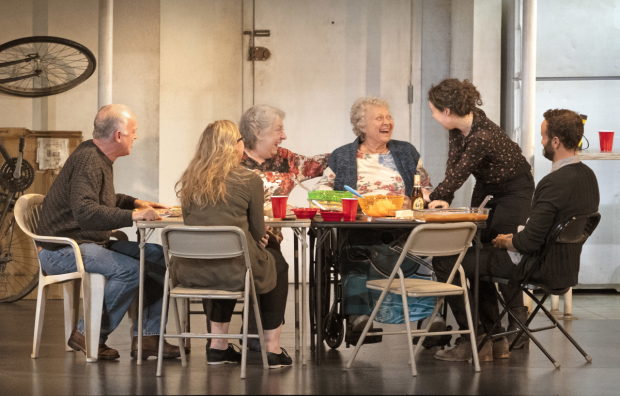Through a Family Dinner, The Humans Looks at a Society on the Verge of Collapse
The Tony-winning play offers a master class in naturalistic acting.

(© Lawrence K. Ho)
Something so small can feel so vast. A simple family dinner can stir up old haunts. Even if one listens closely to the mundane conversations, it's what's not said aloud or what's unseen in the shadows that can sting the most. The Humans lands at the Ahmanson with most of its Broadway opening-night cast, presenting a relatable family in tune with Neil Simon's Jerome family in his classic Eugene Trilogy.
On Thanksgiving Day, Deirdre and Erik Blake (Jayne Houdyshell and Reed Birney) arrive at the run-down Chinatown apartment of their youngest daughter, Brigid (Sarah Steele), with their eldest daughter, Aimee (Cassie Beck), and the girls' aged grandmother, Momo (Lauren Klein), in tow. Brigid's much older boyfriend, Richard (Nick Mills), has cooked dinner and the family sings Irish tunes, tell old stories, joke, and drink — a lot. The cacophonous sounds of the New York City building, from the garbage compactor to the crashing noises from the above apartment, unsettle the parents, who are already on edge from news they must share when, or if, the right time occurs.
Playwright Stephen Karam's rich dialogue offers the perfect balance for the actors to find accessible rhythms together. Karam highlights the family's familiar ways of speaking to one another by having the interloper, the new boyfriend, accidentally climb on others' lines or find himself interrupted often, as if attempting to find an entrance into the circle. David Zinn's two-level set also has the effect of inhibiting communication as family members move through different rooms of the apartment. Many of the revelations, other than the final disclosure, take place upstairs or are overheard between floors.
Houdyshell and Birney, who won Tony Awards for their performances in these roles, spend much of the play listening to conversations not meant for them. The two actors understand their characters so well, they wordlessly convey their emotions about hearing what's exposed. They convey warmth toward their family unit and shame toward their secrets and failures. Steele brings pixie energy to the vibrant child who is nonetheless hampered by her lack of success in life. Beck conveys Aimee's loneliness, her physical agony as her character suffers from a major bowel condition, and her realization that everything she had counted on has slipped away and she must start anew.
Mills treats Richard as a centered individual who has cleaned up his life and just wants his girlfriend's family to appreciate him. He's never desperate, though, always sure of who he is and what he wants. As the fragile grandmother suffering from advanced dementia, Klein shows the audience Momo's inner voice, reminding the family and us that despite being unable to converse comprehensibly, the original matriarch still hovers inside her, capable of connecting through song or prayer, once in a blue moon.
Director Joe Mantello creates a sense of visual and auditory dread even when the dialogue appears cheery. Zinn's fascinating set exposes the insides of the floors and ceilings to show the precariousness of the structures that we hope provide safety and stability. It also visually connects with the crumbling Twin Towers of 9/11, harking back to a family trauma. Justin Townsend's lighting casts a pale gauze over the apartment's crumbling, dull paint. Fitz Patton's sound design impactfully implies the city is enveloping the family — and crushing them.
The play can be overly ambitious at times. The symbolism of the collapsing society represented by the building occasionally clashes with the play's naturalistic aspects. And the final scene, mostly without dialogue, goes on too long to be a rewarding finale. Nevertheless, The Humans is a provocative study of the ordinariness of the human condition that dramatizes how even the minutest stressors can crash down on one's world.











